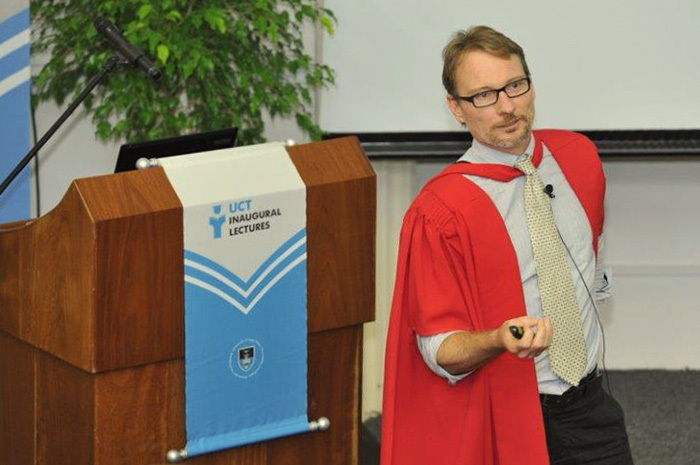'Holding paradox' can help drive social innovation
27 May 2014 | Story by Newsroom
Is business predominantly part of the problem or part of the solution to social challenges? Should scholars engage in practical problems, or should they stand apart for objective analysis?
These two questions framed the inaugural lecture of Professor Ralph Hamann, research director of the Graduate School of Business (GSB), on 14 May 2014. He put these questions to the audience, comprising academics, students and members of the public.
Hamann began by describing the tensions between the role of business and that of scholarship. Much of the time, he argued, we respond to these tensions by either ignoring or polarising them '“ meaning we often fail to grapple with the underlying causes of tension, or end up creating debilitating conflict between key role-players.
Hamann argues that "holding the tension" between opposing perspectives and objectives '“ an approach he calls "paradox thinking" '“ can provide fertile ground for social innovation.
Leadership behaviour of key figures
In a recent research project, Hamann and colleagues found that the success of cross-sector collaboration aimed at addressing complex social problems depended on the leadership behaviour of key figures. Such leaders were able to work through tensions and arrive at innovative solutions by reframing the identities of both the individuals and organisations in conflict, reframing the problem, and developing novel options that simultaneously addressed divergent needs.
He used the Cape Town Partnership to illustrate this, an organisation created in the 1990s in response to the fear that businesses and property owners might migrate from Cape Town's city centre. Initially, the organisation's mission was to keep the streets clean and crime-free. This led to the criticism that it was placing too much emphasis on security, at the expense of social development and the rights of those living on Cape Town's streets.
Rather than ignore or polarise this tension, the Cape Town Partnership's leadership invited critics onto their board, and began facilitating difficult but constructive discussions, taking conflicting perspectives into account. This ultimately contributed to a broadening of the organisation's identity '“ from focusing entirely on ensuring Cape Town's city centre stayed clean and safe, to also ensuring it's a caring space that takes into account the needs of those less fortunate.
With leaders who could "hold paradox" at the helm of the organisation, the problem was reframed by recognising that a security-focused approach could not be applied to a social problem. Reframing both the problem and the organisation's identity allowed for the creation of innovative solutions that simultaneously responded to different objectives. For instance, it led to the creation of new kinds of community courts, which deterred social crimes, while at the same time avoiding channelling offenders into the criminal justice system.
'Scholar activist'
Hamann's colleague at the Graduate School of Business Dr Warren Nilsson described him as a "scholar activist", who simultaneously worked hard at "rigorous theory-building and changing the world".
"If I had to use one word to describe Ralph Hamann's work and his person, it would be generosity ... I see that generosity in the kind of work that [he does] and how [he goes] about that work. If one wants to research cross-boundary and inter-organisational collaboration to confront complex social and environmental problems you have to, like him, be the kind of person that can enter into a meaningful trusting engagement with a CEO of a corporation, a grassroots activist, a city official and other academics," he observed.
Read Prof Hamann's inaugural paper
Listen to the audio recording of Prof Hamann's lectureStory by Abigail Calata. Image by Raymond Botha
 This work is licensed under a Creative Commons Attribution-NoDerivatives 4.0 International License.
This work is licensed under a Creative Commons Attribution-NoDerivatives 4.0 International License.
Please view the republishing articles page for more information.










